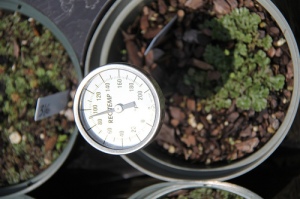Question: How would you describe soil temperature: as a physical property, chemical, or biological? It doesn’t really seem to fit any of those categories nicely, though I’d probably call it a physical property.
–Submitted by Thomas Villars, USDA-NRCS
Answer: Soil temperature is the measure of how hot or cold the soil is. If you want to get more technical, it’s the detection of the internal energy of the soil, or its heat. Soil scientists consider temperature a very important soil physical property and it controls many chemical and biological processes within the soil.

When a farmer plants, he waits for the temperature to rise above a certain value (i.e., he waits until the soil has enough internal energy) so that his seeds will germinate. For every 10 oC rise in soil temperature, we expect biological activities, like soil respiration, to double. If the temperature gets too high, it kills things that live in the soil, like plant roots and other organisms. Likewise, chemical reactions that aren’t mediated by soil organisms tend to go faster as the temperature increases.
Some interesting happenings in soil involving temperature are: 1) the flow of heat and 2) how soils “heat up—in other words, the amount of heat they must absorb to increase the soil temperature. In the first case, heat in the soil flows from places of high temperature to low temperature…so heat can move into the deeper layers of the soil profile. Interestingly, because of the time it takes for heat to move, there is a depth in soils at which the highest temperature is in the winter and the lowest temperature is in the summer.
How fast a soil will “heat up” depends on the soils components. The more water a soil has, the slower it will heat up because water needs to absorb lots of energy to increase its temperature. Dry sand can heat up quickly and to high temperatures, as evidenced by all those people with hot feet at the beach in the summer. Where do they run to? They run to the sand that has water in it!
–Answered by Nick Comerford, University of Florida
Have a question for Soils Matter? Post it as a comment below, or email us at soils-matter@soils.org

1. How does atomic bomb affects the fertility of soils or soil minerals?
2. Effects of electric current on soil physical properties?
Thank you for the questions! We will find someone to answer them as soon as we can.
i want agriculture certificate questions
Dear Kalagi Deo, please visit https://www.certifiedcropadviser.org/ to learn about certification